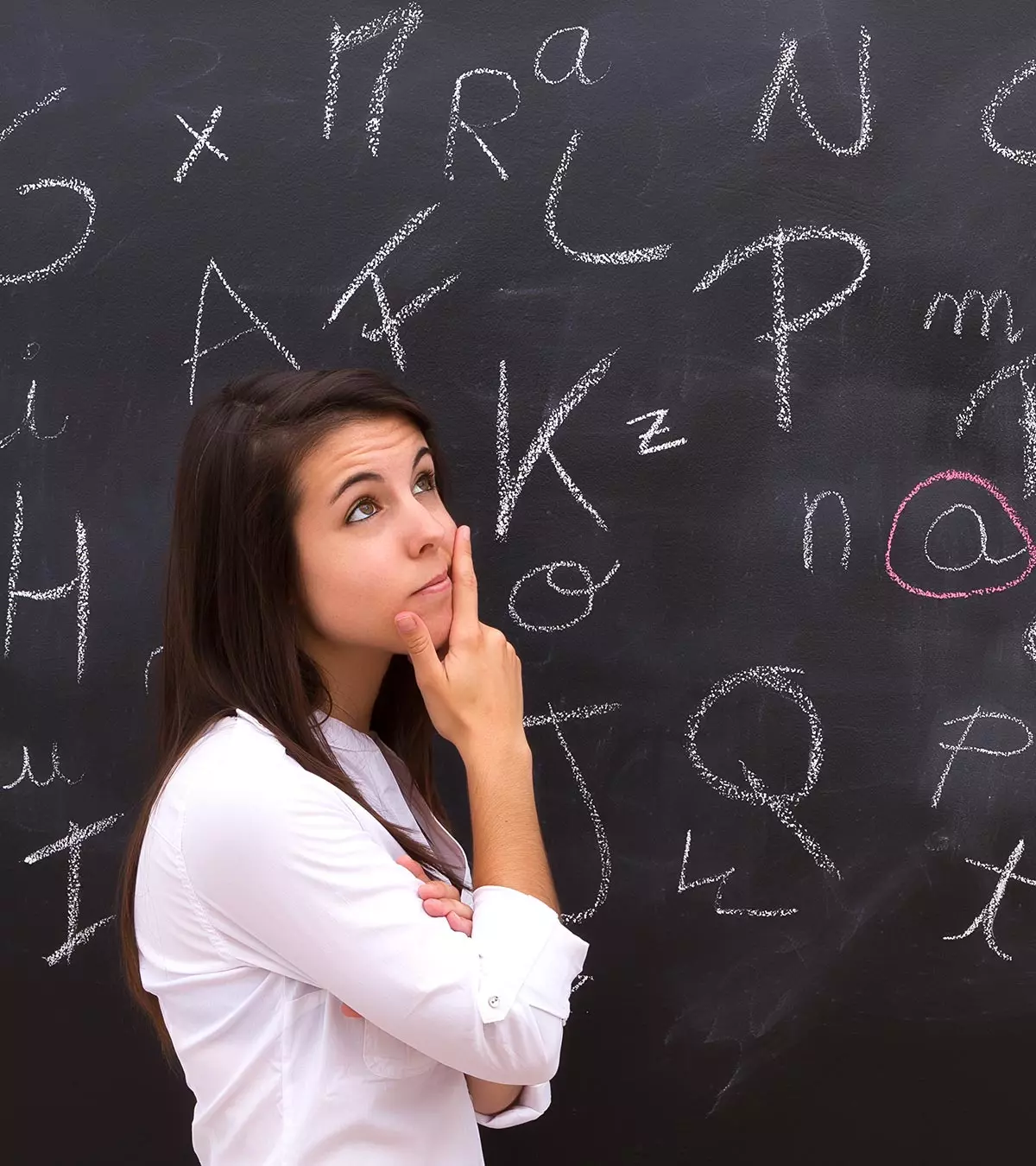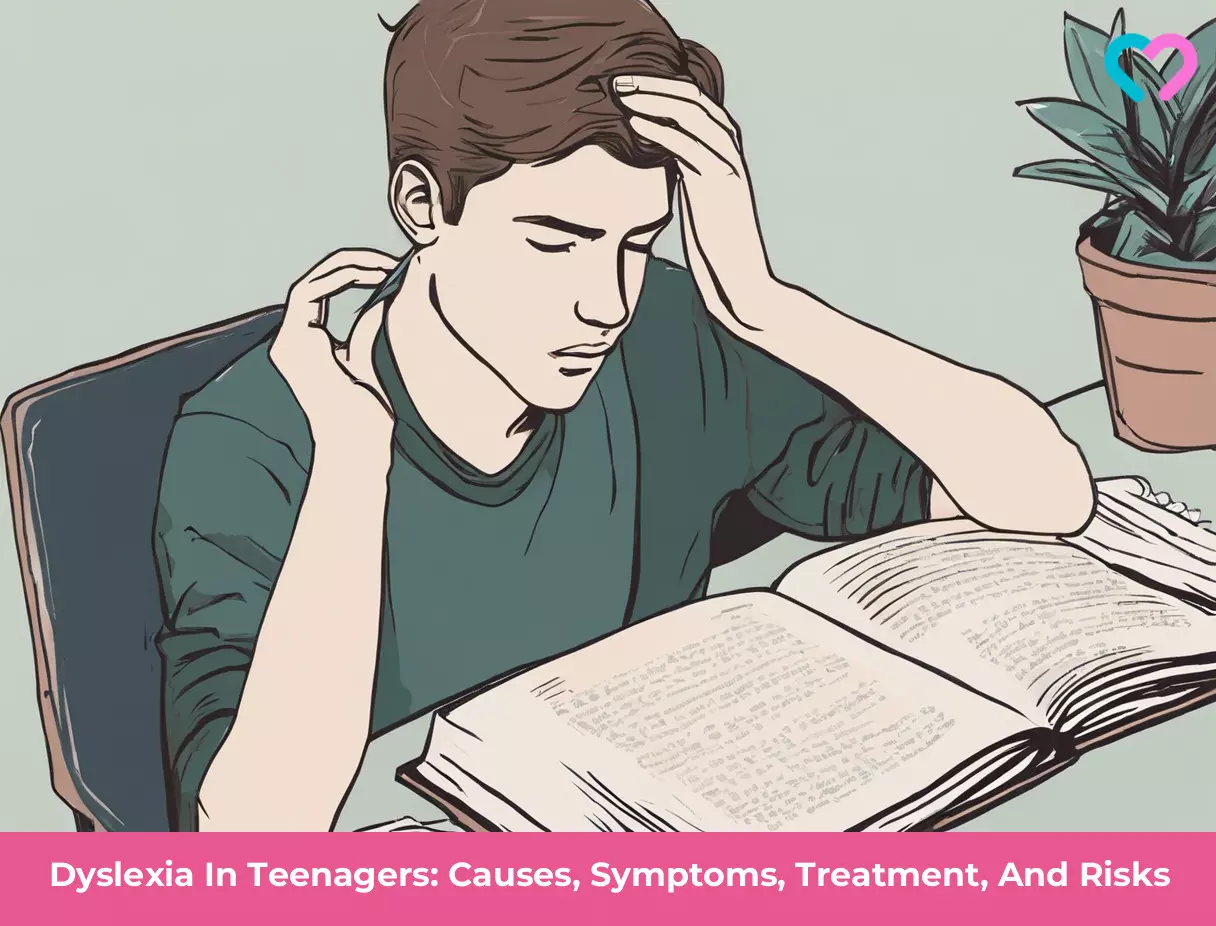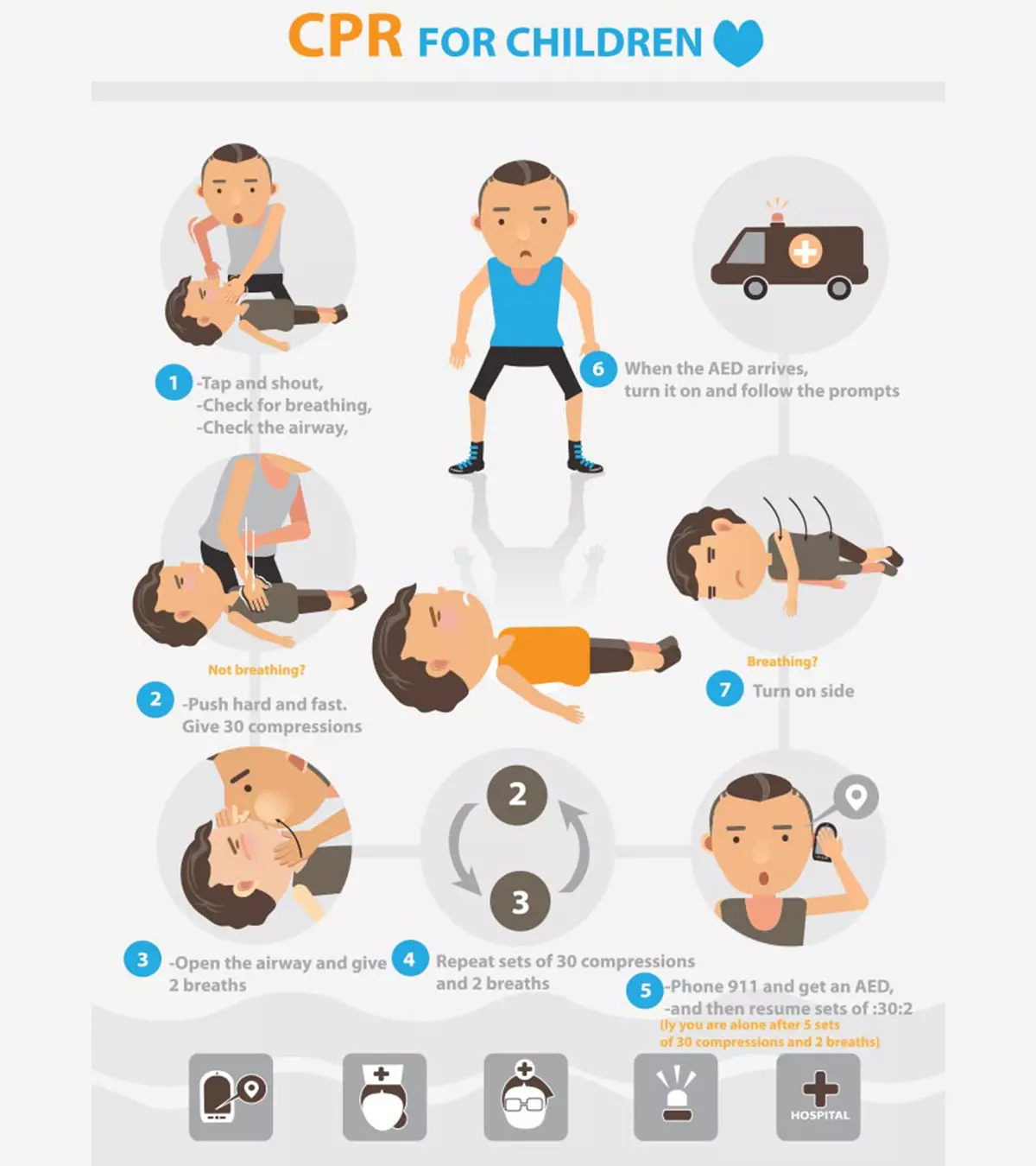
Image: Shutterstock
Dyslexia in teenagers is often challenging to recognize since its signs are usually mistaken as laziness or mischievousness of adolescence. The teen may have trouble doing simple learning skills such as reading or identifying sounds, easily done otherwise. Dyslexia is considered an impairment of visual processing, spatial understanding, and poor phonological processing skills; however some cases of dyslexia may not be related to phonological aspects (the way words sound). According to the European Dyslexia Association (EDA), dyslexia affects nine to 12 percent of the global population, with severe cases occurring in two to four percent of individuals worldwide. The condition occurs regardless of ethnicity, race, language, or gender, and is identified by a few distinct markers.

The International Dyslexia Association defines dyslexia as the difficulties with decoding abilities, poor spelling, and issues with fluent word recognition (1). Some may show signs of dyslexia in the first year of life, and it may go unnoticed. The dyslexia signs may vary with age. Therefore parental awareness plays a crucial role in seeking early medical attention. Although it is a lifelong condition, early educational and tailored interventions, and therapies can enhance the quality of life (2).
Read on to know the causes, signs, diagnosis, and ways to cope with dyslexia in teens.
Key Pointers
- Teenage dyslexia can be challenging to identify as its symptoms overlap with teenage slothfulness.
- Genetics is considered a significant factor in the development of dyslexia, although the precise etiology is uncertain.
- Toddlers with dyslexia may struggle with speaking, recalling color names, and linking sounds with letters.
- Teenagers with dyslexia may experience difficulties in writing, remembering things, and distinguishing between similar letters.
- Early treatments and tailored therapy can improve the quality of life for individuals with dyslexia.
Signs And Symptoms Of Dyslexia In Teenagers
A brain-imaging study suggests that reading difficulties are independent of cognitive abilities (3), so children with dyslexia may show normal IQ and might also excel in areas that do not require reading or writing.
It is important to understand the behavior of the child from birth to teenage years, as most children show signs of dyslexia in early childhood and because they cannot express their difficulties, it can often get ignored.
In toddlers (before school)

It is hard to recognize the signs of dyslexia at this stage as children at this age rarely read or write, but here are a few general signs of dyslexia.
- Difficulty in learning to speak.
- Problems in associating sounds with their letters.
- Difficulty in pronouncing words.
- Trouble in clapping hands for the rhythm of a song, or learning nursery rhymes.
- Unable to follow more than one command at a time.
- Difficulty in remembering names of colors and names, often confusing between similar shaped and pronounced letters (4).
Early Schooling
The signs of dyslexia would become more prominent once the child starts going to school and learns to read and write
. The signs of dyslexia from kindergarten to first grade include:
- Unable to differentiate between similar sounding words like cat, bat, rat. For example, when the teacher asks them to write the spelling of cat, they might end up writing the spelling of bat or rat.
- They also confuse naming similar looking alphabets, for example, they often call D, as B and vice versa.
- Difficulty in writing or reading at the same pace as others in the classroom.
- Shows disinterest in going to school.
- Unable to remember names and directions.
- Might not be able to follow multiple commands, such as, pick up the red color round ball from the table.
- Often complains when asked to read and tries to avoid it (5).
- Slower processing speed
This stage requires active parental involvement, where parents should observe, understand, and get professional advice. With early identification, proper diagnosis, and guidance, dyslexia can be treated effectively. The child’s doctor can conduct a neuropsychological assessment and start designing specific interventions or strategies immediately.
While a dyslexic child may have myriad problems in reading and writing, they often seem to perform better in creative areas such as drawing, solving puzzles, building models, and storytelling.
Preteens and teenage

If the early signs of dyslexia are missed, then they would be carried into the teenage years and even adulthood. Coping with dyslexia at this stage would become tedious for children as they might be subjected to ridicule and punishment for inadequate academic performance.
Here are a few signs of dyslexia in teenagers
- The speed of reading is lower than others of the same age.
- They would have lots of “um’s” while reading aloud.
- They tend to have messy handwriting with many spelling mistakes.
- The confusion of similar-sounding words and letters continues.
- They would have trouble remembering names, places, telephone numbers, and dates.
- Problems in solving mathematical problems correctly.
- Poor language skills.
- Inability to complete the tests on time and takes more time to respond to questions.
- Low self-image and likes to stay invisible in the classroom (5).
- Weak working memory
- Defective executive functioning
As the child progresses in age, the learning and reading would become complex, and they would not know what is wrong with them. This might lead to depression and aggression, and they might resort to misbehavior to cover up for the feelings of being called dumb and/or unintelligent.
Causes Of Dyslexia
The exact cause for dyslexia is not known. However, genetics plays a major role; it is estimated that if the father has dyslexia, then the son would have a 40% chance of being dyslexic; also, dyslexia seems to run in families (6).
Studies suggest that this could be due to defects in the development and functioning of the brain. There are many theories that tried to explain why this happens in some, below are a few of them.
- The orthodox model believed that the difficulty in reading might be due to brain damage.
- The Davis model suggests that it could be due to a conflict of messages to the brain, where the eyes tell something, and the sense of balance and sound tells something else.
- Dual route model says that there are two routes in which our brain perceives information. One route is by actually reading the words, and sentences and the second route is not reading all the words, but the ability to produce the correct response. Disturbances in either of these pathways could result in dyslexia (6).
Studies also found that dyslexia is often found in children with attention deficit hyperactivity disorder (ADHD) (7). So, it is important to understand if the learning disability is due to dyslexia or ADHD or both. Furthermore, it is also essential to look for hearing difficulties, such as auditory processing disorder, if the teen is diagnosed with ADHD or dyslexia.
 Quick fact
Quick factWhen To See A Doctor
Take your child to the doctor if you notice they face difficulties in reading and writing, are confused with words, and make distinct mistakes repeatedly. Early interventions would help the child to improve with time; it is advised to notice and identify subtle signs of dyslexia and seek professional advice.
However, it is never too late to help your child in dealing with dyslexia; if your teenager is showing signs of dyslexia, then try to understand them and seek medical advice.
Diagnosis Of Dyslexia In Teenagers

There is no one test for diagnosing dyslexia; your doctor would look for various signs, look at family history, and perform tests to assess the cognitive skills and reading abilities of the child.
Some of the factors that could help in diagnosing dyslexia are
- Reading and spelling tests to identify the pattern and symptoms of dyslexia.
- Assessing the IQ of the child to rule out any psychological disorders.
- Gathering information about the child’s behavior from parents and teachers.
- Enquiring about family life and atmosphere at home, in order to rule out stress or abuse.
- Questions about family history to find out if anyone in the family has learning disabilities (7).
Treatment For Dyslexia In Teenagers
There are no drugs or surgical treatments available yet to correct the brain dysfunction that might be causing dyslexia in children. However, with proper care and special educational techniques, children with dyslexia might be able to overcome their reading and writing problems.
Lauren, a teen blogger, opens up about her experience with dyslexia, “Though I was diagnosed fairly early into elementary school, it was only the start of a long road of dealing with schools and trying to help me work around my learning disability. Today, my dyslexia isn’t as huge of a part of my life as it was when I was younger, thanks to a lot of support from tutors and my mother, who fought fiercely to get me the help I needed. I’m lucky that I had the support I did because many people in my position don’t (i).”
Helping a dyslexic child requires time and effort from the caregivers and the teachers, so what can you do to help your child?
How To Deal With Dyslexia In Teens
For Parents and Caretakers

Parents and caretakers play an important role in helping a dyslexic child. Your child may not be able to comprehend what is happening to them; they might have a million questions and fears, which can cause depression and anxiety. So, it is your responsibility to assure them that you are there for them to support and help them overcome.
- Be patient and listen to their feelings and difficulties, make them comfortable to open up and talk about their feelings. If they show anger or frustration, do not show anger or condescension, instead, handle them with compassion and empathy.
- Never use the words lazy, incompetent, or dumb as it can affect self-esteem in teens and cause severe damage to their self-image.
- Sit with your child and help them recite and practice the confusing words and sounds.
- Make them close their eyes and practice imagining and writing the letters and numbers while reading the name and number aloud. This will help them connect the shape of the letter with the pronunciation.
- Appreciate and reward small achievements they make while practicing .
- Set simple and realistic goals that can be summed up into a bigger goal.
 Quick tip
Quick tipFor Parents and Classroom tips
Dyslexia is not a psychological disorder that requires special schools to help them to read and write. All dyslexic children possess a similar IQ like the average child; it is just that they have trouble reading and writing. So, schools and teachers could consider giving extra attention and be open to implement special teaching techniques to help teenagers with dyslexia. A few teaching techniques include
- Give simplified instructions: Give simplified instructions: As dyslexic teenagers have a hard time understanding multiple instructions, the teacher could simplify it or break down into two or more instructions. This can make it easier for them to learn comprehension and decode complex information.
- Fewer assignments: Another way to help dyslexic teenagers is to give them less work until they pick up their reading and writing pace like others. This would avoid anxiety in them.
- Repeat instructions: Asking the child to repeat the instructions could help them remember better. Once the instructions are told, ask the child to repeat them to the teacher or a classmate.
- Practice reading: Give the student one paragraph to read aloud, correct them, and help them wherever they are struggling. Gradually you can increase the reading material after seeing the child’s progress.
- Audio recordings: If the lessons have audio recordings, then encourage the child to listen to them while reading the text, this will help them connect to the sound and letters better. Using multisensory instruction or teaching approaches might be effective for children with dyslexia.
- Track daily progress: Track the daily progress the child is making; this will help in understanding and realigning your teaching strategy.
- Write keywords or phrases: Before beginning the lesson, the teacher can write the keywords and points on the board.
- Make them sit close: Children who might have difficulty in reading and writing should be made to sit close to the teacher so that the teacher can pay special attention, and the child would also get shielded from external distractions (4).
- Assistive technology: Using assistive technology-based tools in the classroom can help children with learning disabilities immensely. They can allow them to learn quickly and function independently.
- Individualized education plan (IEP): Children with dyslexia can benefit from a personalized education plan created by teachers to help them function and learn more effectively. It is an ongoing planning tool that requires inputs from both the school and the child’s family.
- Teacher training: Schools should provide teachers with appropriate training to cater to the specific needs of children with dyslexia and learning disabilities.
Risk Factors Of Dyslexia In Teenagers

When dyslexia is not identified early on, the child might carry it into puberty. The trouble begins when the child is unable to cope up with the rest of the children at school. They would not understand why they are not able to read or write like others, because dyslexia is not something which they can control, this might lead to psychological problems such as
- Stress and anxiety might develop as the child or the people around them may not fully understand the reason behind the child’s reading and writing problems.
- Dyslexia can also affect the child’s self-image, when they are made to feel less capable. Research suggests that inferiority feelings develop by the age of ten and it would be extremely difficult to develop a positive self image later on, which is why it is important to identify and correct dyslexia at an early age.
- Dyslexic children might also develop depression, as they would not be able to succeed in academics.The signs of such a depression could be different, where the child might become more active and rebellious to cover up for their problems and hurt and shame. They lose interest in school and tend to have negative feelings about themselves. Some children may lose hope that they could ever succeed in life.
 Point to consider
Point to considerFrequently Asked Questions
1. Can dyslexia get worse in the teenage years?
Dyslexia typically appears in childhood but is frequently ignored or untreated until adolescence or adulthood. As a result, untreated childhood dyslexia can worsen in adolescence (9).
2. What are the types of dyslexia?
Dyslexia is classified as surface, phonological or dysphonetic, rapid automatic naming dyslexia, visual or dyseidetic, double deficit, and attentional dyslexia based on the various aspects where dyslexic individuals face difficulties (10).
3. What are dyslexics good at?
Although dyslexic individuals struggle with reading and vocabulary, they have excellent spatial reasoning and puzzle-solving skills, strong memories of stories, and are excellent conversationalists. They are also creative, empathic, imaginative, critical thinkers, and have strong analytical skills (11).
4. Does dyslexia affect social skills?
Yes, dyslexia significantly impacts one’s social skills because of their inability to retrieve words quickly and respond properly in social situations (12).
5. Do dyslexics lack empathy?
No, in fact, they have a very genuine personality and feel more empathetic toward others, owing to their experience (11).
6. Is dyslexia a form of mental illness?
Dyslexia in teenagers should not be mistaken for laziness or mischievousness. As a parent, give full support to your child if you recognize any unusual problems they are facing. Consult a doctor if you notice them experiencing difficulties in reading and writing, confusing words, and making typical mistakes repeatedly. Be prepared to make a few adjustments and accommodations to cater to their needs. Proper care and special educational techniques can help dyslexic children overcome their reading and writing problems. A calm and inclusive classroom environment can also be helpful. Lastly, you should accept the situation and move on. Proper treatment, patience, and support could help your child overcome the problem and will ensure their emotional well-being.
Infographic: Supporting And Caring For A Teenager With Dyslexia
Although there is no assured cure for dyslexia, early evaluation, adequate care, and timely treatment are vital to managing the condition. This infographic details care practices and valuable tips for dealing with a teen with dyslexia. Give a thorough read, and communicate with a doctor to ensure your teen gets appropriate and timely medical care.
Some thing wrong with infographic shortcode. please verify shortcode syntax
Illustration: Dyslexia In Teenagers: Causes Symptoms Treatment And Risks

Image: Stable Diffusion/MomJunction Design Team
Personal Experience: Source
MomJunction articles include first-hand experiences to provide you with better insights through real-life narratives. Here are the sources of personal accounts referenced in this article.
i. Dyslexia awareness month: From a teen POVhttps://teenlibrariantoolbox.com/2019/10/20/dyslexia-awareness-month-dyslexia-from-a-teen-pov-a-guest-post-by-teen-blogger-lauren/
References
1. Definition of Dyslexia; International Dyslexia Association
2. Dyslexia; Journal of Communication Disorders, Deaf Studies and Hearing Aids
3. Dyslexia independent of IQ; MIT News
4. Dyslexia In the Classroom; International Dyslexia Association
5. Signs of Dyslexia; The Yale Center For Dyslexia & Creativity
6. Thuraya Ahmed Al-Shidhani and Vinita Arora; Understanding Dyslexia in Children through Human Development Theories; Sultan Qaboos University Medical Journal
7. Mirian Sánchez-Morán, et al.; Genetic association study of dyslexia and ADHD candidate genes in a Spanish cohort: Implications of comorbid samples; NCBI
8. Gerd Schulte-Körne; The Prevention, Diagnosis, and Treatment of Dyslexia; NCBI
9. Sara Giovagnoli et al.; Internalizing Symptoms in Developmental Dyslexia: A Comparison Between Primary and Secondary School; NCBI
10. Gerd Schulte-Körne; Are There Different Types of Dyslexia?; University of Michigan
11. The Many Strengths of Dyslexics; University of Michigan
12. Gerd Schulte-Körne; Complete Guide to Dyslexia; Child Mind Institute
13. Michal Zelcer and Ran D. Goldman; Omega-3 and dyslexia; NCBI
14. Dyslexia; Raising Children Network
15. Gerd Schulte-Körne; Dyslexia symptoms; National Health Service, UK
16. M Huc-Chabrolle et al.; Psychocognitive and psychiatric disorders associated with developmental dyslexia: A clinical and scientific issue; NCBI
17. Is a Learning Disability Considered a Mental Illness?; Learning Disabilities Association of America
Community Experiences
Join the conversation and become a part of our nurturing community! Share your stories, experiences, and insights to connect with fellow parents.
Read full bio of Dr. Maymunah Yusuf Kadiri
Read full bio of Dr Bisny T. Joseph
Read full bio of Swati Patwal
Read full bio of Anindita Ghatak


















